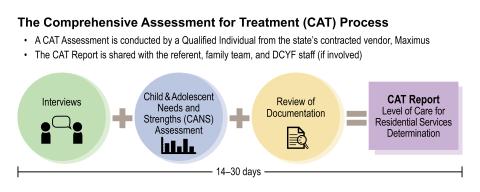Why is a CAT assessment necessary to access residential care?
Research shows that most children or young people with a mental health or substance use disorder do better when they stay at home and receive treatment there, while remaining close to their family or other caregivers.
For that reason, the System of Care is designed to build the ability of the family/caregivers, community providers, and the young person to live, work, and learn in their community.
Out-of-community residential services are provided when necessary and with the goal of preparing the child or young person and their support network for their return to the community or to a lower level of care (supervised apartments, for example). When seeking residential care, the youth and family will be part of an assessment process called the Comprehensive Assessment for Treatment (CAT).
Comprehensive Assessment for Treatment (CAT):
When there is a concern that a child/youth may need residential care, the first step is to refer the child and family to the Comprehensive Assessment for Treatment (CAT). The CAT assesses the severity of your child’s mental health or substance use concern, safety issues, the capacity of your family and community to support your child or youth, and if an episode of short-term residential treatment will be helpful, and if so, what level of residential care would best meet their needs. The CAT is conducted by a designated Qualified Individual employed by Maximus. The NH Department of Health and Human Services has contracted this private provider to provide this service.
A Comprehensive Assessment for Treatment (CAT) assessment takes about 30–60 days. It consists of interviews, a research-based assessment called the Child & Adolescent Needs and Strengths (CANS) Assessment, and a document Review. A CAT assessment results in individualized recommendations for the youth’s care, outlined in a report and shared with the family and their team and whatever entity referred them.

Comprehensive Assessment for Treatment (CAT) includes:
- Interviews
Family members, school staff, clinicians, JPPO, etc - Child & Adolescent Needs and Strengths (CANS) Assessment
- Document Review
E.g., psychological evaluation, school records, clinical treatment history - These are used to create a Level of Care Recommendation
CAT Report
- Results of interviews, CANS, and document review
- Referral, family, and team recommendations
Can be added to plan of care / case plan / treatment plan - Level of Care for Residential Services Determination
Recognized by court, insurance, referral sources, and others as a valid level of care determination
How to Access a Comprehensive Assessment for Treatment (CAT)
There are several ways to access a CAT and then referral for residential treatment:
- Division of Children, Youth and Families (DCYF).
- One of the state’s Care Management Entities (CMEs); Connected Families NH and NFI North.
- Hampstead Hospital can submit referrals for an assessment for residential treatment directly to Maximus via secure email.
- Anyone else who wants to refer a child or youth for residential treatment, including family members, needs to connect with BCBH via secure email for a pre-screen, then they will be referred to Maximus if determined to be an appropriate referral.
If the child or youth needs residential treatment for a substance use disorder, the Doorway can be helpful. To reach a Doorway, call 2-1-1, or use the Doorway Locations page.
Helpful CAT Resources
- Learn about what to expect and how to prepare for the CAT Check out the Maximus NH Tools and Resources section
- You can also read this 2-page PDF overview of the NH CAT Services Program
- Email Maximus if you have questions about the CAT

